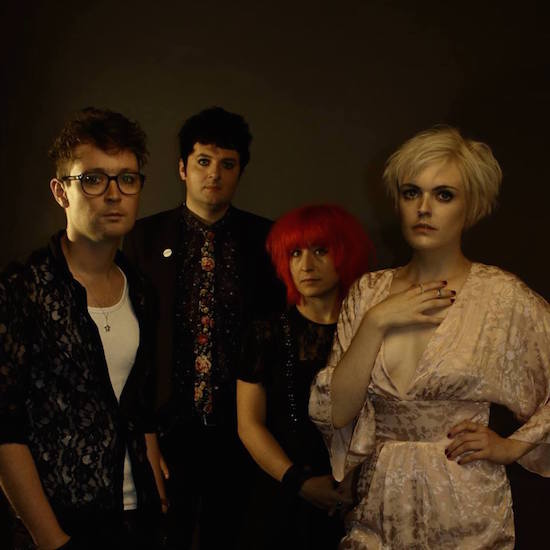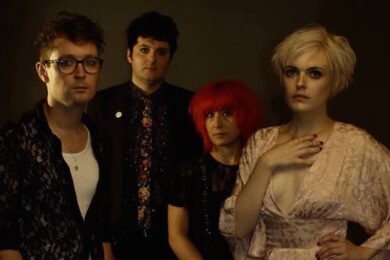Today sees the release of the third album from Desperate Journalist, titled In Search Of The Miraculous.
"I’m not going to beat around the bush: the album has a fairly high concept (or perhaps pretentious) starting point," explains singer Jo Bevan, It’s titled after the artist Bas Jan Ader’s several works centered round his idea to sail across the Atlantic in the smallest craft ever to do so, as a piece of performance art."
She continues: "It’s an album about the terrifying beauty of hope, and the excitement of possibility. And love. Because it always does come back to that really, if I’m honest."
The album is out now, and can be streamed above. You can also see the band on tour in the UK through March and into April. You can find the list of dates here, and keep reading below for a track-by-track guide to the album from singer Jo Bevan. Check our review of the album here.
Murmuration
Whilst we were writing this record I was reading Paul Farley and Michael Symmons Roberts’ beautiful book ‘Edgelands’ which is all about the romance and poetry in overlooked parts of the British environment – mundane and lonely interzones like roadside hedgerows, green-belt industrial parks, marshes, suburban woodland, and my favourite overused image: motorways. As a child who travelled a lot, and an incessant romanticiser of everything I can clap my eyes on, I’ve always found these inbetween places bleakly beautiful; both reminiscent of the innocence of childhood and of the quotidian cynicism which people associate with adult responsibility.
A murmuration is a swoop of birds (usually starlings) en masse, always at dusk, always apparently oblivious to and unaffected by whatever is happening on the earth below. When I’ve had panic attacks, fainting spells, swells of desire, or any surfeit of feeling, I’ve felt like my blood is literally fluttering: magically, externally bewitched. So, opening the album with 1000 shoegaze guitars swooping around me singing about overpowering, elemental lust via all of this imagery sets the tone I think.
Cedars
When we were thinking about filming a video for Cedars all I could really think of was Aylesbury train station. I couldn’t take A level art at my own school because I had too many humanities subjects already (an aversion to logic which makes me probably a rather entertaining conversationalist but not someone usefully equipped for much else). So I would take a rickety little 1970s Chiltern Railways train from my home town of chair-"famous" High Wycombe and make the brambly, grafitti-y sunset walk, sucking on a pocket-money bought ten pack of Royals and listening to my friend Josh’s mixtapes, all the way to unremarkably Brutalist Aylesbury college two evenings a week after school to learn about chiaroscuro, sfumato, the Golden Section, all these lofty-godly Italian concepts, in a dusty sixties-yellow classroom.
The initial lilty jazz-chord music Rob came up with reminded me of my beloved Prefab Sprout and it was their ordinariness/High-Art interface (cf: all of Steve McQueen) which inspired the tone of the words. In terms of what it’s about, it’s your standard what-have-I-done-with-my-life scenario. Even when in the first glorious flush of a new chapter of your life, it’s hard to escape worrying you’ve blown it.
Jonatan
I had a friend called Kasper from Northern Norway who was one of the most fascinating, vibrant, funny and earnest people I have ever met. He died shockingly young in 2016 and I am lucky to have spent some of my brief time on this earth in his company. This is a song about him.
International Waters
I remember Rob writing the initial demo to this on an iPad in a flat on the Italian Rivieria during an incredibly intense thunderstorm, his hair flying everywhere, Beethovenesque as he nodded and gestured it into something like a song. We were staying in an apartment on a steep coastal hillside street and it was the middle of the night and the entire road became a lightning-illuminated waterfall. If you’d seen it in a film you’d think it was so sympathetically fallacious you’d puke. I think musically it’s the oddest thing we’ve done, but it hangs together so beautifully and is exactly as cinematic as the circumstances of its conception might suggest. It’s the centrepiece to the album in a way; the lyrics are about the life of Bas Jan Ader, the conceptual artist who aimed to sail across the Atlantic in the smallest craft in history and who got lost at sea. The whole record is in effect me making sense of my pursuit of happiness in a new relationship as an artistic search for the Sublime, because reader, I Have No Chill.
Argonauts
This song originated as a very subdued, slow guitar sketch Rob came up with and which we initially all but discarded. I ended up writing a lyric which needed to be set to something slow and atmospheric, and revisited the demo to see if it would work. I think the sparkling reverby hum effect on the piano is what makes this song: it’s the sound you hear just before you fall into a deep luscious dream about someone you love.
Black Net
Lyrically this is my attempt at Hounds of Love: a song about burgeoning (and sometimes even well-worn) sexuality and how nightmarish it is when it consumes you. I have recurring nightmares featuring most of the imagery here. The "lovely black net" is that weird relief in the idea that someone of authority might come along and stop your adolescent fumbling – an authority Deus ex Machina Dad diving down to save you from yourself. I think this is my favourite piece of music on the record. The drums in particular reverberate like intrusive, but not entirely unwelcome, thoughts.
Ocean Wave
I love well-wrought words, but I also love list songs if the words are pretty. You can get abstract and just enjoy how everything sounds. A collection of words/images/things can still be very evocative in its grouping though I think, which is why gallery curators get paid the big bucks. This is a list of boats which shipwrecked in the North Sea, and the Ocean Wave of the chorus is the name Bas Jan Ader gave to his doomed little sailboat.
Girl Of The Houses
Girl-of-houses is a Norse poetic kenning, a kind of portmanteau metaphor, for "girlfriend/wife". Norse poetry is riddled with these and reading through how the world is described through such phrases gives a startlingly immediate and affecting impression of how their writers viewed their everyday existence. I love the way they immediately connect you with someone from thousands of years ago, going about their life in a very remote place. As I was already greedily overreaching with my "pursuit of the sublime = my Hollyoaks life" idea I thought this image was also appropriate. Funnily/tragically, the lyrics to this song started as a hugely wordy Wu-Tang Clan-esque rap because I was listening to a load of Buttress at the time and going inside my own mind. Of course it would never be performed as such, because I am a posh white girl from the Home Counties, and it would be shit. I chiselled it all down into something far more economic and Fleetwood Mac to fit the Widescreen Lonesome Cowboy vibe of the music.
Satellite
I always said I’d never write a straight up love song, but life has a funny way of making you look like an idiot when you make such blanket proclamations.
To Be Forgotten
This was inspired in part by The Line of Beauty, which I read for the first time whilst we were writing this record. The naïve yearning and turmoil of the narrator resonated with me, obviously. I also loved the fact that the story ends up pulling back to reveal him as simply one of many historically meaningless players in a political production much larger than him, though his emotions initially seem so all consuming – yet his love and his affection are no less real. I also was thinking about several people I know who, though stunningly interesting or talented or beautiful or all of the above, let their shyness take over rather than allowing themselves to be celebrated. We had this huge House of Love-meets Big Country sounding piece of music, so I thought it would be pleasingly perverse to have a lyric about the blissful relief of being negated sung along with something so heroic. It’s ambivalent; I find the idea of being a faceless one of millions comforting, but I also think my tiny emotional life is very important. I wanted the album to end on a confusing high, because at its best that’s what life is, I think.




